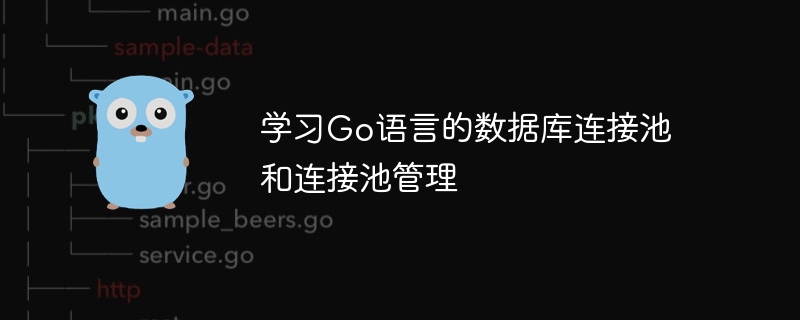Home >Backend Development >Golang >Learn Go language database connection pool and connection pool management
Learn Go language database connection pool and connection pool management
- WBOYWBOYWBOYWBOYWBOYWBOYWBOYWBOYWBOYWBOYWBOYWBOYWBOriginal
- 2023-11-30 09:44:27793browse

Learn the database connection pool and connection pool management of Go language
In the development process of Go language, database connection pool and connection pool management are very important concepts. Database connections are very precious resources. If each operation requires establishing and closing connections, the performance of the system will decrease and it is prone to connection leaks or too many connections. Therefore, using a connection pool can effectively improve database access performance and resource utilization.
The concept of the connection pool is to cache established, reusable database connections in memory. When necessary, the connection is obtained directly from the connection pool and returned to the connection pool after use. This avoids frequent creation and closing of database connections and improves database access performance.
In the Go language, the database connection pool function can be implemented by using a third-party library. Currently, the more commonly used libraries include: go-redis, go-sql-driver/mysql, go-redis/redis, etc. These libraries provide a series of methods and interfaces to manage database connection pools, such as obtaining, releasing connections, and limiting the maximum number of connections.
For the management of the connection pool, you can follow the following steps:
- Create a connection pool: First you need to create a connection pool object, which needs to include the connection address and user name , password and other information as well as the capacity of the connection pool.
- Initialize the connection pool: After creating the connection pool object, you need to initialize the connection pool. During the initialization process, you can establish a certain number of connections and put them into the connection pool by calling the methods provided by the library.
- Get a connection: When you need to perform database operations, you can get a connection by calling the method of the connection pool object. If there is an idle connection in the connection pool, an available connection will be returned directly; if there is no idle connection in the connection pool, you can choose to block and wait or return an error message.
- Use connection: After obtaining the connection, you can perform corresponding database operations. Note, don't forget to return the connection to the connection pool after use, so that other requests can reuse the connection.
- Release connection: When the connection in the connection pool is no longer used, you can choose to close the connection or return it to the connection pool. If the number of connections in the connection pool exceeds the set maximum limit, resources can be released by recycling some connections.
The above are the general steps for using Go language to implement database connection pool and connection pool management. Through reasonable use of connection pools, database access performance and resource utilization can be improved. However, it should be noted that the size of the connection pool needs to be adjusted according to actual business needs. If it is too small, it may lead to insufficient connections, and if it is too large, it will waste resources.
In the process of using the connection pool, you also need to pay attention to some details. For example, whether the connection in the connection pool times out, how to handle the connection failure, etc. Generally speaking, the connection pool library will provide corresponding settings and callback functions to handle these problems.
In short, mastering the knowledge of database connection pool and connection pool management is very important for Go language developers. Reasonable use of connection pools can improve system performance and stability and reduce database connection overhead. I hope this article can be helpful to everyone in the process of learning Go language.
The above is the detailed content of Learn Go language database connection pool and connection pool management. For more information, please follow other related articles on the PHP Chinese website!

